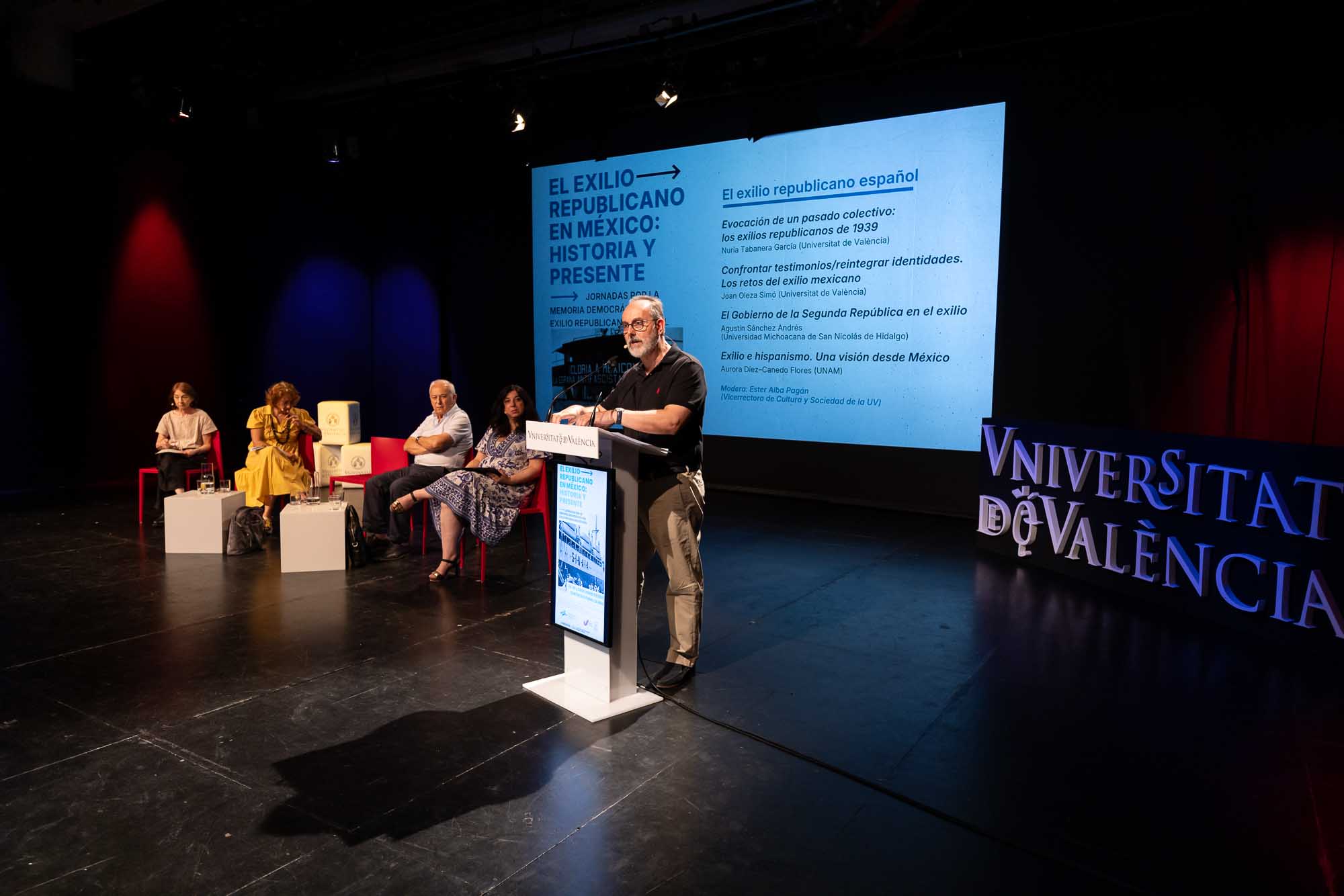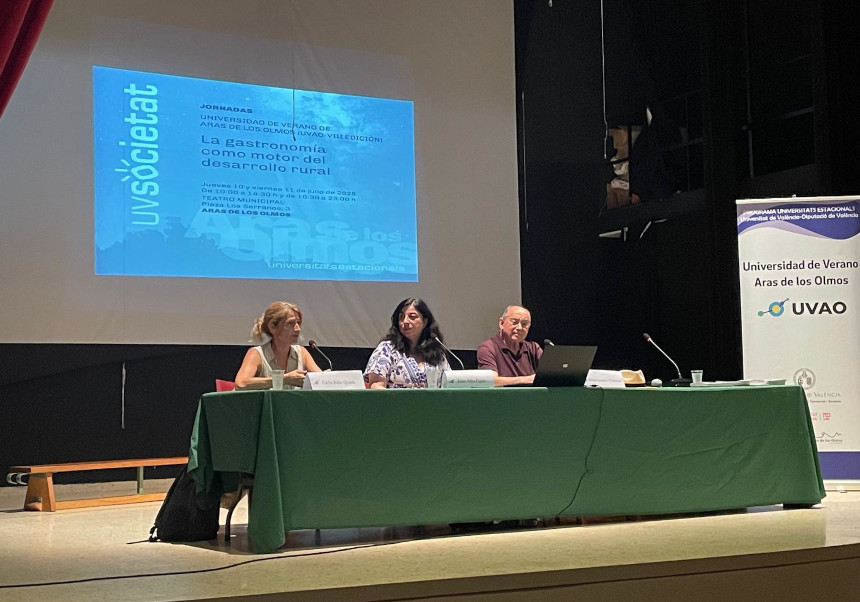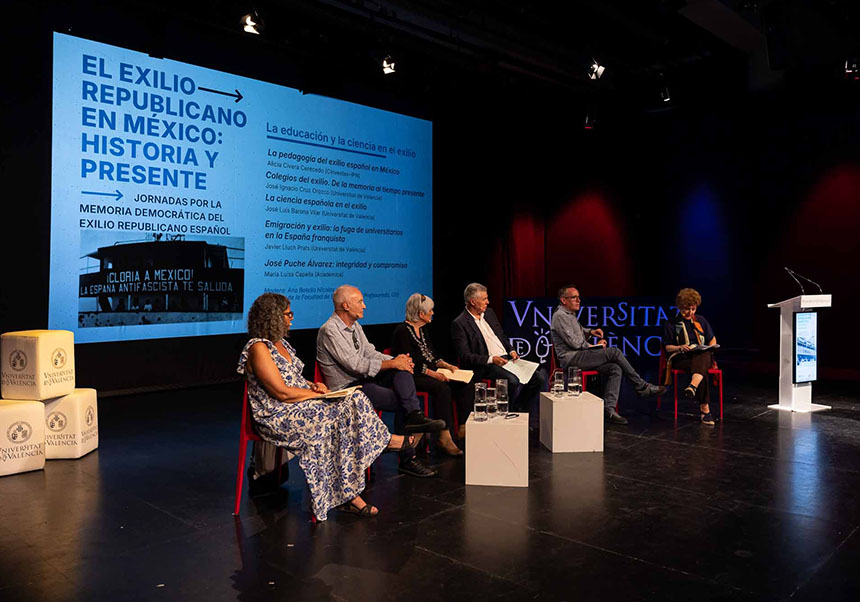The Spanish Republican Exile Chair of the UV and the Spanish Athenaeum of Mexico begin their activities with a conference at La Nau
- Office of the Vice-Principal for Culture and Society
- June 27th, 2025
On 25 and 26 June 2025, the Universitat de València (UV) became the main hall for the conferences “The Republican exile in Mexico: history and present” organised by the Chair for Spanish Republican Exile, born from the agreement between the UV and the Spanish Athenaeum of Mexico and formalised on December 2024 during the International Book Fair of Guadalajara (Mexico). This was the first big activity of the Chair, and they are already working on other initiatives.
Close to 50 people —family from exiled ones and specialists from Mexico and the UV— took part on this first meeting, part of the Conferences for the Democratic memory of the Spanish Republican Exile.
Throughout two very intense days, La Nau Cultural Centre held conferences focused on the analysis of the exile from multiple perspectives: historical, educational, scientific, artistic and testimonial. It was remembered that over 20000 Spaniards, many of the Valencians, found refuge in Mexico after the Spanish Civil War. There, in 1949, they founded the Spanish Athenaeum of Mexico with the goal of preserving the republican values and promoting culture and education.
“The birth of this Chair opens up a door to history. It is a space for recognition, strict research and ethical reflection about one of the most tragic and yet most brilliant chapters of our shared history: the Spanish exile to Mexico”, say the president of the Spanish Athenaeum of Mexico, Juan Luis Bonilla.
These conferences, also held in Madrid (they have developed between 10 and 26 June), have been backed up by the Athenaeum of Madrid, the Instituto Cervantes, the Spanish Embassy in Mexico, the Ministry of Territory Politics and Democratic Memory, as well as Mexican universities such as UNAM and The College of Mexico, among other institutions.
The Principal of the UV, Maria Vicenta Mestre, highlighted that the Universitat de València “didn’t ignore the historical events”. She remembered the deep wounds suffered during the dictatorship, such as the depurations, prosecutions and irreparable loses, highlighting that “recovering the memory also builds the future from justice”. “Brilliant names were lost. And I could verify that in Mexico are better remembered than here. Their recovery is a moral and historical obligation”, added, while thanking the participation of everyone involved and, specially, the work of the Vice-Principal for Culture and Society, Ester Alba, academic Head of the Chair.
Ester Alba began her intervention condemning the current governmental practices that violate human rights and remembered figures depurated by the Franco regime such as the Principal José Puche, the dramatist Max Aub, the full-time university professor Juan Bonet, or the poet Juan Gil-Albert. Without forgetting Principal Juan Bautista Peset Alexandre, executed in 1941.
The conferences will be available to rewatch on the YouTube Channel of the Universitat de València.
Recovering the great Valencian names from exile
No official records exists for the number of Valencian people that got exiled after the Spanish Civil War. However, Mexico, under the government of Lázaro Cárdenas, took in thousands of republicans who contributed to the cultural and educational development of the country. Many founded editorials, schools, universities and journals, leaving a permanent mark.
Among the renowned exiled Valencians we find Max Aub (1903–1972), dramatist, writer and founder of the theatre company El Búho, at the Universitat de València, precisely in what is nowadays know as La Nau Cultural Centre. Despite being born in France from German parents, he grew up in Valencia and considered himself to be deeply linked to the city. As he used to say: “One is from where he studies upper secondary school education”.
Another key figure is José Puche Álvarez (1901–1982), doctor, politician and Principal of the UV during the 30s, who defended the university autonomy from exile. In fact, he was one of the founders of the Spanish Athenaeum in Mexico, professor of multiple universities (UNAM among them), and presided the Committee for Supporting Spanish Refugees.
Also recalled were the figures of Juan Gil-Albert, José Gaos, José Medina Echavarría, Josep Renau, the Ballester family (Manuela and Tonico), and full-time university professor on Philosophy in Valencia Juan Bonet Bonell (civil governor of Castellón and exiled to France), who was put by the Gestapo into concentration camps before arriving to Mexico, where he managed the Lluis Vives school until his death.
Special attention was given to the role of women in exile, mentioning key figures such as Manuela Ballester, María Zambrano, Remedios Varo and Ofelia Guilmánt.
Homage to Manuel Usano: medicine, sport and exile
As the perfect finale for the conferences, a memorial plaque and the mural Esport malgrat tot were inaugurated. Homenatge a Manuel Usano, by artist Álex Gambín at the Sports Pavilion of the Blasco Ibáñez Campus. The work belongs to the Els valors de la Universitat: art i patrimoni als campus programme, within the 525 anniversary of the UV.
Manuel Usano (1909–1987), who studied at the UV, was a doctor and a pioneer of sport medicine in Spain. After the Spanish Civil War, his contract at the university was cancelled due to political reasons, which forced him to exile himself first to Bogota and next to USA, where he continued his career. Recently, and coinciding with the commemorative acts of the 525 anniversary, the institution gave him a recognition.
The mural, composed as if it was a photographic collage, includes images from archive that summarise his life. Among them, we find pictures of Usano practicing pole vault and other sporting scenes of the Valencia from 1929. On a side of the mural, next to the commemorative plaque, his portrait can be found, extracted from the Antifascist Popular Militias carnet in which he appears as voluntary doctor at the Teruel frontlines between 1936 and 1937.
Álex Gambín, graduate in Fine Arts by the Universitat Politècnica de València, has developed a work connecting the past with the present through the usage of images of archive as a tool for critic and reflection.
The act, presided by vice-principal Ester Alba, academic director of the Chair, was very emotional. It had the intervention of one of Usano’s daughter and a reading of exile poetry by the UV Poetry Club and students Juan C. Bonet. Around fifty people came to the event.

















